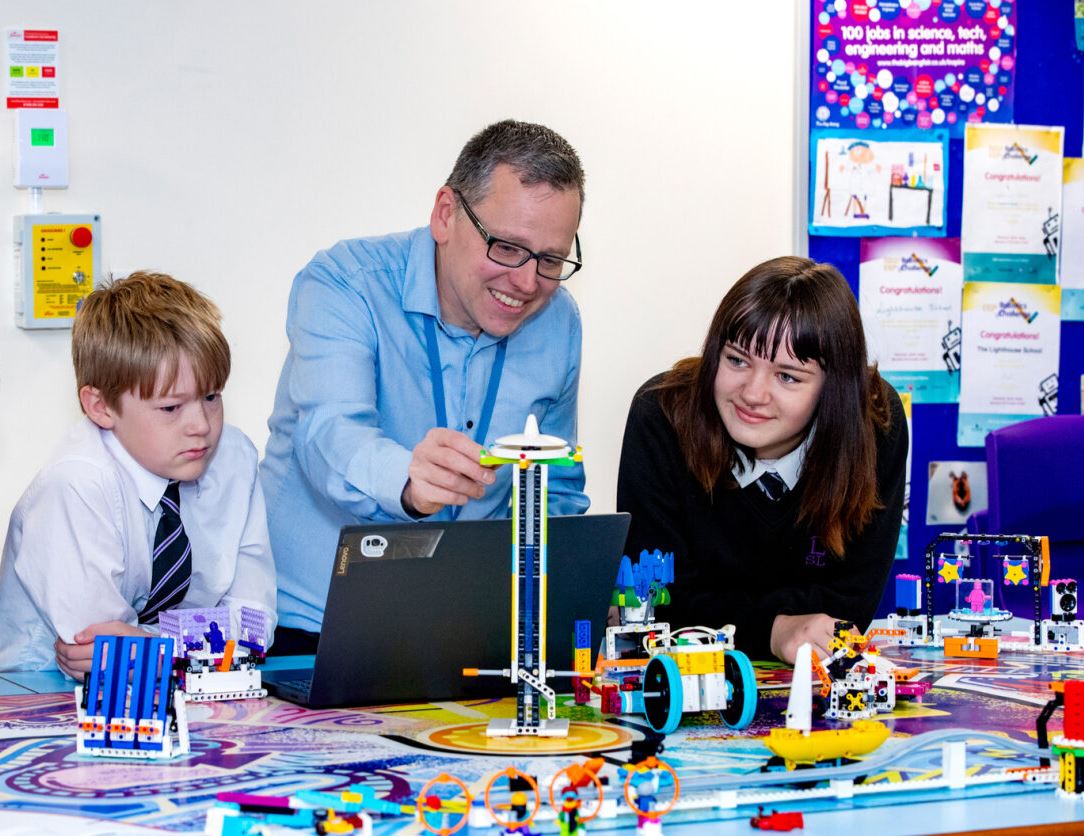Science

Why is it important to our students’ futures?
Science helps us to develop a deeper understanding of the world and how it works. At Lighthouse School, science focusses on understanding across all the scientific disciplines (Biology, Chemistry, and Physics) in a practical way that both satisfies and fosters curiosity. Students also acquire practical skills to help them plan and carry out experiments, analyse data, evaluate and develop conclusions based on their learning. We develop the students’ problem-solving skills and understanding of the scientific method in a way that benefits them across all their other subjects in school. Science enables the students to be creative and question the world around them, as well as delivering scientific skills for everyday life (e.g. understanding health and disease, how to calculate electricity bills, and how to wire a plug).
What does Science look like in Lighthouse School?
- We have a spiral curriculum that supports our learners in retaining learning and building on concepts. This coincides with the research which identifies this as the most effective way of supporting autistic learners with generalising skills.
- We deliver Entry Level Certificate (1-3), Crest awards, OCR Cambridge Technical Level 2 (GCSE equivalent), OCR Cambridge Technical Level 3 (A-level equivalent). This broad range of courses fits our students’ wide range of abilities and needs. We also offer Engineering as an additional Option and implement a mixture of CREST awards and OCR Level 2 Cambridge Nationals. *We celebrate Science across the school with a yearly STEM week that all subjects and students are involved with. This is adapted to the needs and interests of our students.
- We engage the students with STEM projects. This includes the ‘Tomorrow’s Engineers’ Robotics Challenge – in which Lighthouse competes nationally against mainstream schools.
- Our Science teacher consults and advises external organisations on specialist STEM education. For example, she spoke about under-represented audiences at the Tomorrow’s Engineers Conference and helped engage with the BSA to make access to CREST awards at higher levels easier for students with SEND.
- Science has strong links with other subjects. E.g. CSI project with English, applying Compound Measure from Maths.
- Students can also choose to study Engineering in KS4 and KS5 (the curriculum is below. This is integrated into the Science curriculum in KS3 and is an option subject - taught to Level 2 - in KS4 and KS5.
What visitors/enrichment activities take place in the subject?
- Students visited a local university to see how they could pursue further education in Science
- Students accessed The Big Bang Fair with multiple speakers visiting for celebrations in school.
- Students participate in the Tomorrow’s Engineers Robotics competition.
What have students gone on to achieve in the subject?
- Last year our largest number of students achieved their Entry Level in Science.
- The vast majority of students achieved excellent Level 2 results with more students achieving Level 2 in Science than any other core subject.
- Lighthouse students won the regional final in the Robotics Challenge and competed Nationally. Lighthouse is recognised as being one of the top 25 schools in the country for robotics.*
Science Curriculum:
| Subject | Topic | Key Stage | Year | Level | Linked Subject |
|---|---|---|---|---|---|
| Science | Heating and Cooling | KS3 | 1 | All | Maths |
| Science | STEM Project | KS3 | 1 | All | Engineering. Computing, English |
| Science | Cells/The Human Body/ Skeletons and Movement | KS3 | 1 | All | RSHE, Horticulture |
| Science | Simple Chemical Reactions/Particles | KS3 | 1 | All | Food Tech |
| Science | Forces/Pressure | KS3 | 1 | All | Computing |
| Science | Animal Adaptation/Ecology | KS3 | 1 | All | Horticulture |
| Science | Space | KS3 | 2 | All | Maths |
| Science | STEM Project | KS3 | 2 | All | Engineering. Computing, English |
| Science | Metals/Acids and Alkalis | KS3 | 2 | All | Maths |
| Science | Variation/Inheritance | KS3 | 2 | All | RSHE |
| Science | Breathing/Digestion | KS3 | 2 | All | PE, Food Tech |
| Science | Periodic Table and Pure/Impure Substances | KS3 | 2 | All | Food Tech |
| Science | Microbes and Disease/Healthy Living | KS3 | 3 | All | RSHE, Food Tech |
| Science | Energy Transfers/Energetics | KS3 | 3 | All | Maths |
| Science | Sound/Light | KS3 | 3 | All | Maths |
| Science | Reproduction | KS3 | 3 | All | RSHE, Wellbeing |
| Science | STEM Project | KS3 | 3 | All | Engineering. Computing, English |
| Science | Respiration/Photosynthesis | KS3 | 3 | All | Horticulture |
| Science | Chemistry 2 – Chemical Reactions, Acids/Alkalis | KS4 | 1 | Entry Level | Maths, Food Tech |
| Science | Biology 2 - Environment and Variation | KS4 | 1 | Entry Level | RSHE, Geography |
| Science | Physics 2 – Electricity, Light and Sound | KS4 | 1 | Entry Level | Maths |
| Science | Biology 1 – Human Body, Cells, and Reproduction | KS4 | 2 | Entry Level | RSHE, Wellbeing, PE, Food Tech |
| Science | Chemistry 1 – Periodic Table and Elements | KS4 | 2 | Entry Level | Maths |
| Science | Physics 1 - Forces | KS4 | 2 | Entry Level | Community, Wellbeing |
| Science | Science of the Earth and Solar System | KS4 | 1 | L2 | Maths, Geography |
| Science | Science of Telecommunications | KS4 | 1 | L2 | Maths, Creative Media |
| Science | Science of Health | KS4 | 2 | L2 | RSHE, Future Skills, Maths |
| Science | Science in the Media | KS4 | 2 | L2 | RSHE, Citizenship, English |
| Science | Fundamentals of Science | KS5 | 1 | L3 | |
| Science | Lab Techniques | KS5 | 1 | L3 | Future Skills |
| Science | Control of Hazards | KS5 | 1 | L3 | Future Skills, RSHE |
| Science | Microbiology | KS5 | 2 | L3 | Maths |
| Science | Product Testing Techniques | KS5 | 2 | L3 | Food Tech |
Engineering Curriculum:
| Subject | Topic | Key Stage | Year | Level | Linked Subject |
|---|---|---|---|---|---|
| Engineering | Principles of electronic and programmable sysytems | KS45 | 1 | L2 | Science, Computing |
| Engineering | Making and testing electronic circuits | KS45 | 1 | L2 | Science |
| Engineering | Developing programmable systems | KS45 | 1 | L2 | Computing |
| Engineering | Exploring lego/coding | KS45 | 2 | L2 | Computing |
| Engineering | Simple electronics | KS45 | 2 | L2 | Science |
| Engineering | Mechanical projects, or self directed project such as the fairground | KS45 | 2 | L2 | Science |
